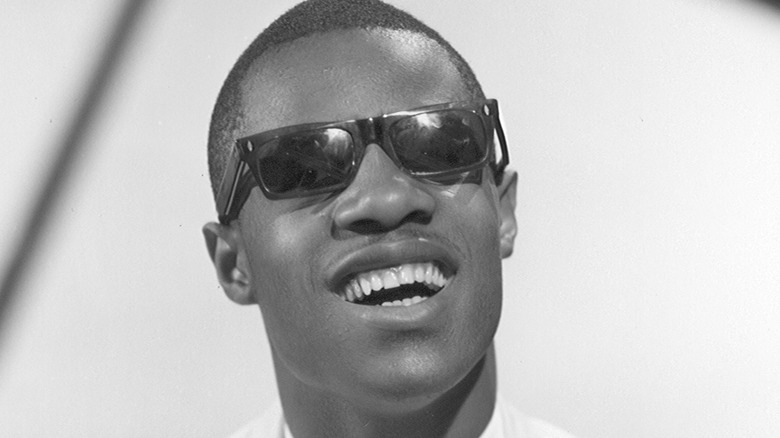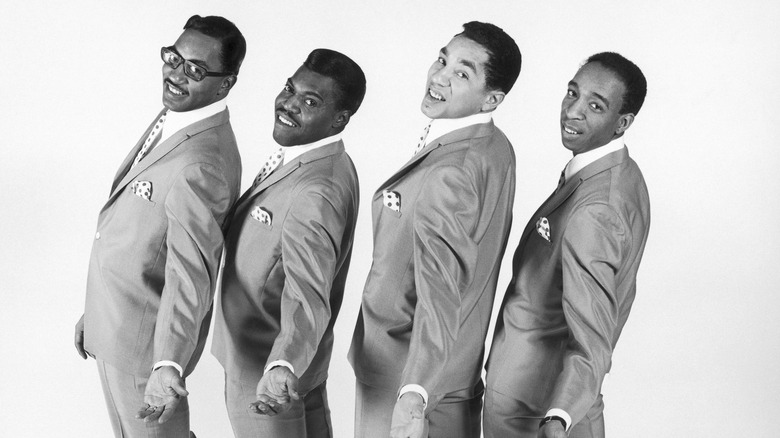The Unlikely Story Behind Smokey Robinson And Stevie Wonder's Song, The Tears Of A Clown
Stevie Wonder has worked with the biggest names in the music business over the course of his long and illustrious career, including such luminaries as Paul McCartney and Michael Jackson. Today, he is a bona fide pop music legend, with more than 100 million record sales to his name (via American Songwriter).
Wonder exploded onto the music scene in 1963, when his single, "Fingertips," flew to the top of the Billboard Hot 100 chart. What was notable about Wonder at the time was that, despite the incredible musical abilities that his single showcased, he was at the time of the record's release just 12 years old.
Still a minor, by the mid-'60s Wonder had already proven himself to be a hugely talented songwriter as well as an accomplished performer, so much so that he was already composing music for other notable artists, some of whom were his senior by more than a decade. One of these was Smokey Robinson, who in the early '60s had, with his group The Miracles, enjoyed a period of sustained success with singles such as "Shop Around" and "I Second That Emotion," turning Motown Records into a chart phenomenon in the process (via Biography).
However, though Robinson had written songs for other artists that had become No. 1 singles in the U.S. (via Stereogum) he had yet to get a single under the name Smokey Robinson and The Miracles to the very top of the Billboard Hot 100, and as it turned out, it would take the involvement of the teenage Stevie Wonder — as well as a whole lot of patience on Robinson's part — to get him there.
Just another album track
The song that would eventually take Smokey Robinson and The Miracles (pictured) to the top of the Billboard Hot 100 was the now-timeless hit "The Tears of a Clown." As described by Stereogum, the music for the song was written by the prodigious Stevie Wonder with his producer Hank Crosby, who also helped him record a demo.
Stuck for ideas for lyrics, the two brought the recording to Robinson, whose first impression from the track's opening bars was that it reminded him of the circus, which made Robinson think of a story he had previously alluded to in the song "My Smile Is Just A Frown (Turned Upside Down)," he wrote for Motown label mate Carolyn Crawford: that of the clown Pagliacci, the title character of an opera libretto by Ruggero Leoncavallo.
In "The Tears of a Clown," Robinson evokes the story of Pagliacci to describe a character who is hiding their sadness behind a smile "to fool the public," but who can't hide their heartbreak from a lover from whom they have parted. Robinson and The Miracles recorded their vocals in 1967, and the song was included as an album track on their LP "Make It Happen" later that year, but was not selected as a single.
A sleeper hit
As noted by Stereogum, "The Tears of a Clown" remained little appreciated as the final deep cut on "Make It Happen" for years before it was finally embraced by the wider public outside Smokey Robinson's obsessive fanbase, even after Robinson unexpectedly quit music in 1969 to spend more time with his family.
However, in 1970 the U.K. was experiencing a huge wave of interest in American soul records as a result of a club movement known as Northern Soul. Though Northern Soul enthusiasts tended to reach for more obscure gems from smaller labels rather than those familiar records offered by Motown, and the Miracles had ceased to exist since Robinson's departure, the label nevertheless asked the head of their British fan club to select a pre-existing Miracles song to release as a single to capitalize on the Northern Soul Movement, per Stereogum. Her choice was "The Tears of a Clown," which flew to the top of the British singles chart and convinced Motown executives to re-release it in the U.S., where it achieved the same feat and catalyzed Robinson's return to show business.
Since then, the popular response to the unexpected Miracles hit has barely dimmed, with the single becoming a legendary unexpected blockbuster. The song was inducted into the Grammy Hall of Fame in 2002, while as recently as 2021 Rolling Stone magazine included "The Tears of a Clown" in their list of the 500 greatest songs of all time, placing it at 313 above Curtis Mayfield's "Move On Up" and Bill Withers' "Lovely Day."

